

The Great Pacific Garbage Patch. Resulting from several research missions, travelling across and above the GPGP, The Ocean Cleanup team compiled an unprecedented amount of data to better understand the plastic that persists in this region.
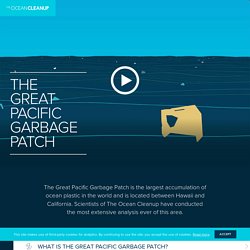
Research Expeditions Scientists have been studying this area since the 1970's - usually by means of dragging a small sampling net through the debris. This method showed a bias towards smaller objects and did not provide much insight into the larger pieces, and, thus, the entire scope of the GPGP. 'Great Pacific Garbage Patch' Threat To Marine Life. Home - ACT Container Deposit Scheme. Amazing #TrashTag Challenge Before & After Posts. Plastic pollution. Plastic pollution, accumulation in the environment of synthetic plastic products to the point where they create problems for wildlife and their habitats as well as for human populations. In 1907 the invention of Bakelite brought about a revolution in materials by introducing truly synthetic plastic resins into world commerce.
By the end of the 20th century, however, plastics were found to be persistent polluters of many environmental niches, from Mount Everest to the bottom of the sea. Whether being mistaken for food by animals, flooding low-lying areas by clogging drainage systems, or simply causing significant aesthetic blight, plastics have attracted increasing attention as a large-scale pollutant. US Refuses to Join Global Effort to Curb Plastic Pollution. Terrawatch: the rivers taking plastic to the oceans. Every minute one rubbish lorry’s-worth of plastic is dumped into the sea.
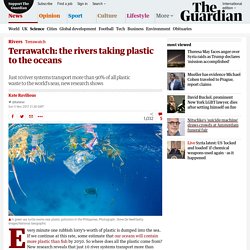
If we continue at this rate, some estimate that our oceans will contain more plastic than fish by 2050. Plastic recycling industry's problems costing councils up to £500,000 a year. Major problems in the plastic recycling industry are costing local councils in England up to £500,000 extra a year, as they struggle to deal with the continuing fallout from import bans imposed by countries who are no longer able to take the UK’s waste.
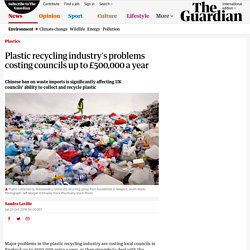
A survey by the Local Government Association (LGA) revealed nearly half of councils who responded (52) say China’s ban is having a significant impact on their ability to collect and recycle plastic, due to rising costs. Fourteen councils across the country say their recycling costs have increased by an average of half a million pounds a year, in part because of rising processing charges per tonne.
“It’s clear that the ban by China on imported waste, which could soon be implemented by other countries, could have a marked impact on councils’ ability to recycle,” said Martin Tett, environment spokesman for the LGA. We found UK plastic waste in illegal dump sites in Malaysia. For years, most of this material went to China.
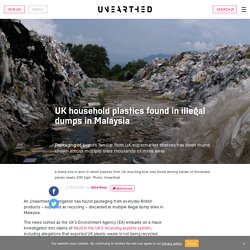
But since China banned these imports at the start of 2018 – citing fears of contamination and pollution – Malaysia has become the world’s top destination for plastic for recycling. How We Showed the Oceans Could Clean Themselves - Boyan Slat on The Ocean Cleanup. Rozalia Project. Take Action: Plastic Doesn't Belong in the Ocean - Ocean Conservancy. The Ocean Cleanup, developing technologies to extract, prevent and intercept plastic pollution.
5 Gyres – Understanding Plastic Pollution Through Exploration, Education, and Action. Oceans Will Have More Plastic Than Fish By 2050. There will be more plastic in the world’s oceans than fish, in terms of weight, by 2050, according to a new report released by the World Economic Forum.
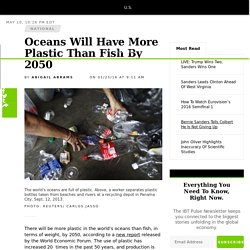
The use of plastic has increased 20 times in the past 50 years, and production is expected to double again in the next 20 years, Newser reported Sunday. The report, which is based on interviews with more than 180 experts and analyses of more than 200 other reports, paints a bleak picture for the future of plastics. Plastic has become incredibly popular due to its versatile functionality and low cost, but it is severely hurting the environment, the report warns. Nearly one third of all plastic packaging do not make it into collection systems, meaning it ends up clogging infrastructure or floating in nature. Indian Ocean Garbage Patch. There are trash vortices in each of the five major oceanic gyres.
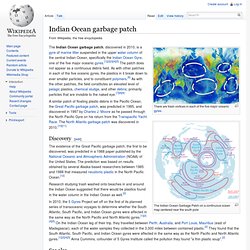
The Indian Ocean Garbage Patch on a continuous ocean map centered near the south pole The Indian Ocean garbage patch, discovered in 2010, is a gyre of marine litter suspended in the upper water column of the central Indian Ocean, specifically the Indian Ocean Gyre, one of the five major oceanic gyres.[1][2][3][4][5] The patch does not appear as a continuous debris field. As with other patches in each of the five oceanic gyres, the plastics in it break down to ever smaller particles, and to constituent polymers.[6] As with the other patches, the field constitutes an elevated level of pelagic plastics, chemical sludge, and other debris; primarily particles that are invisible to the naked eye.[7][8][9] Great Pacific garbage patch. Gyre of debris in the North Pacific Ocean The Great Pacific garbage patch, also described as the Pacific trash vortex, is a gyre of marine debris particles in the north-central Pacific Ocean.
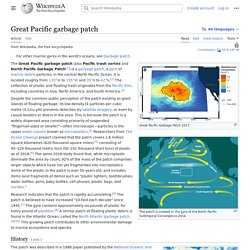
It is located roughly from 135°W to 155°W and 35°N to 42°N.[1] The collection of plastic and floating trash originates from the Pacific Rim, including countries in Asia, North America, and South America.[2] The patch is actually "two enormous masses of ever-growing garbage". What has been referred to as the "Eastern Garbage Patch" lies between Hawaii and California, while the "Western Garbage Patch" extends eastward from Japan to the Hawaiian Islands. How We Can Keep Plastics Out of Our Ocean. Tiny Island, Big Plastic Problem. Environmental issues NSW: Fears pesticides are making sea Turtles ill - Coffs Harbour news.
Returned to the open ocean, in an instant the green sea turtle was gone.
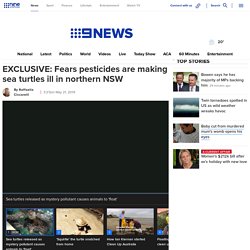
The release at Woolgoolga headland on NSW’s mid-North coast, was the second performed that day and went off without a hitch. For the past four months, the animal had been confined to a tank at Dolphin Marine Conservation Park in Coffs Harbor, recovering from buoyancy issues caused by a build-up of internal gasses. It's becoming more common in sea turtles found in northern NSW. “We can’t say exactly what is causing the buoyancy issues, that’s the great question,” vet Duan March, a director of the Sea Turtle Foundation, told nine.com.au.
“But sadly, the only way to treat ‘float’, is to wait it out.” March believes the extensive use of pesticides in the agriculturally-rich region could be playing its part in making these turtles ill. “Turtles have been around for hundreds of millions of years, so they are pretty good at adapting to the marine environment,” he said. This is what happened to “Flip” . © Nine Digital Pty Ltd 2019. 5 things you need to know about plastic pollution. 3 - Plastic pollution is damaging marine life Plastic pollution is damaging marine life It affects animals throughout the food chain and ends up on our plates A recent study has found that nearly 700 marine species have encountered plastic debris, of which 17% are listed as near threatened, vulnerable, endangered or critically endangered on the IUCN red list.
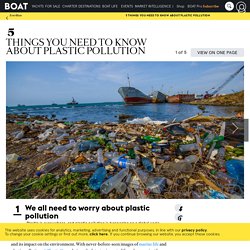
A staggering 90% of seabirds are now thought to have ingested plastic. Marine animals can become entangled in plastic litter, such as lost fishing nets, causing injury and in many cases death. This has been especially prominent for whales and turtles. A recent study has found that nearly 700 marine species have encountered plastic debris, of which 17% are listed as near threatened, vulnerable, endangered or critically endangered on the IUCN red list. Marine animals can become entangled in plastic litter, such as lost fishing nets, causing injury and in many cases death. Plastic Pollution - Sea Life Trust.
The SEA LIFE Trust is a registered not for profit marine conservation organisation working globally, regionally and locally to find solutions for the issues of plastic pollution and microplastics.
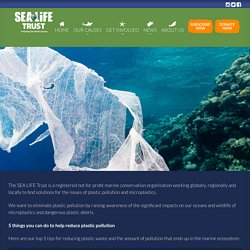
We want to eliminate plastic pollution by raising awareness of the significant impacts on our oceans and wildlife of microplastics and dangerous plastic debris. 5 things you can do to help reduce plastic pollution. How plastic pollution is affecting seals and other marine life. Plastic waste is littering our oceans and threatening the lives of millions of marine animals.
Seals, whales, dolphins, seabirds, fish, crabs and many other sea animals are dying and becoming sick because of this deadly environmental concern. Microplastics are a major part of the issue. Microplastics are tiny pieces of plastic which come from larger plastics that have degraded over time. Sea animals often eat microplastics because of their small size. And plastic contains toxic chemicals, which can increase the chance of disease and affect reproduction. In 2014, an estimated 15 to 51 trillion microplastic particles were floating in the world’s oceans, weighing between 93,000 and 236,000 tonnes. What is ghost gear and how is it connected to microplastics? Nordic countries call for global treaty on ocean plastic pollution. In a major step forward in the fight against marine plastic pollution, Nordic governments have become the first in the world to formally call for a global treaty to tackle the plastic crisis in our oceans.
In a major step forward in the fight against marine plastic pollution, Nordic governments have become the first in the world to formally call for a global treaty to tackle the plastic crisis in our oceans. The landmark declaration was made today at a gathering of the environment ministers of Denmark, Finland, Iceland, Norway and Sweden at the Nordic Council in Reykjavik. The announcement comes after world leaders failed to agree meaningful policy decisions on the issue at the United Nations Environment Assembly in Nairobi last month. "This milestone declaration by Nordic governments should serve as inspiration for others.
Chapter 3. Plastic pollution - Environmental Investigation Agency. Moving forward Our marine plastic pollution campaign is focused on obtaining strong regulatory measures at international, European and national levels to achieve a significant reduction in plastics entering the oceans. Our work covers a range of sources from the pre-production plastic pellets (so-called ‘nurdles’) that pollute our shorelines to single-use plastic items and other unnecessary plastic packaging to the ‘ghost’ fishing gear that ensnares and kills marine wildlife. We are campaigning to secure Europe-wide legislation to dramatically reduce sources of single-use plastic and microplastic entering our seas from land while also tackling the major sources of plastic pollution originating from shipping and fisheries. Both within Europe and the UK, we are working to obtain world-leading policies on single-use plastics that will catalyse international action.
Marine Plastic Pollution in Waters around Australia: Characteristics, Concentrations, and Pathways. 7 Ways To Reduce Ocean Plastic Pollution Today - Oceanic Society. Pieces of plastic cover the beach in Capetown, South Africa. © Maleen / Marine Photobank. Plastic and how it affects our oceans - Science News - ABC News. Plastic pollution is killing our marine wildlife. Here are a few ways you can help. Updated 12 Apr 2018, 2:20amThu 12 Apr 2018, 2:20am Plastic pollution is a huge problem for marine wildlife.
According to the World Wildlife Fund, 80 per cent of marine pollution is generated by land-based activities and it's having a devastating effect on our oceans. Just yesterday a sperm whale that washed up on a beach in Spain was found to have died due to nearly 30 kilograms of trash that blocked its digestive system. Oceans - United Nations Sustainable Development. 14.1 By 2025, prevent and significantly reduce marine pollution of all kinds, in particular from land-based activities, including marine debris and nutrient pollution. Ocean Plastics Pollution. A Global Tragedy for Our Oceans and Sea Life. Marine Plastic Pollution - Boomerang Alliance.
Causes, Effects and Solutions of Plastic Pollution. As the world’s population continues to grow, so does the amount of garbage that people produce. Plastic Pollution. Unenvironment. 10 Facts About Plastic Pollution You Absolutely Need to Know. A man takes photos of piles of garbage washed on shore at the Zouq Mosbeh costal town, Lebanon, Jan. 22, 2018. Environmentalists say a winter storm has pushed a wave of trash onto the Lebanese shore, stirring outrage over a waste management crisis that has choked the country since 2015.
Hussein Malla/AP. Plastic Pollution. 403 Forbidden. Tonnes of plastic waste pollute Cocos Island beaches, and what you see is only a fragment - Science News - ABC News. A remote tropical island paradise off the coast of Western Australia in the Indian Ocean has become home to hundreds of tonnes of rubbish. Asia, Africa Cause 90% of Plastic Pollution in World's Oceans. Rise Above Plastics - Surfrider Foundation Australia. The ocean is turning into a plastic soup. Most plastic pollution at sea starts out on land as litter on beaches, streets and sidewalks. Rain or overwatering flushes that litter through a storm drain system or directly to creeks, streams and rivers that lead to the ocean.
After plastics enter the marine environment they slowly photodegrade into smaller pieces that marine life can mistake for food, sometimes with fatal results. Home - The Last Plastic Straw. Stop trashing Australia. Marine plastic pollution is a huge problem affecting all of the world’s oceans with microplastics increasingly making their way into our food chain in everything from seafood to sea salt. Plastic pollution choking Australian waters and killing wildlife: CSIRO study. GP0STRHRF PressMedia. Pacific plastic dump far larger than feared: study. Ocean Plastic Pollution - Australian Marine Conservation Society. Plastic Pollution Coalition. Plastic Pollution. Plastic pollution - WWF-Australia. Plastic Pollutes (@PlasticPollutes) Goal 14: Life below water.
Plastic pollution. Mariana Trench: Deepest-ever sub dive finds plastic bag. Researchers find 20,000 pieces of plastic on the Firth of Forth. Plastic pollution crisis: How waste ends up in our oceans. Dead Philippines whale had 40kg of plastic in stomach. Plastic pollution is killing our marine wildlife. Here are a few ways you can help. Dead Albatross.